Wednesday Bolts – 2.1.17

Sam Anderson of NY Times Magazine with a big Westbrook feature today: “Everyone had
stories like these. I got the feeling that Westbrook’s personality, the sheer intensity of his presence, is an energy field that seeps into every square centimeter of the Thunder organization. When Westbrook is around, everyone is aware of him, and he is never not around. Players arrive at the gym in the morning to find Westbrook already there. Sometimes they come in at night to put up extra shots, and Westbrook will already be there again, in the weight room, working out. You can begin to imagine how Kevin Durant, a talent with equal or greater claim to the organization but not nearly Westbrook’s force of personality, might have been driven to look for his own space elsewhere.”
Brett Dawson: “Slim as the Thunder’s margin for error has been this season – and against the NBA’s best teams, it’s been razor-thin – it’s been whittled to virtually nothing without Kanter, who had emerged in January as OKC’s second-best scoring threat. The center, who’s out an extended period with a broken bone in his right forearm, provided offense for an Oklahoma City team with few options. And against the Spurs, the Thunder was desperate for it. So significant was the Thunder’s need for scoring that with 8:43 to play in the third quarter and his team trailing 66-49, Billy Donovan subbed shooter Anthony Morrow for stopper Andre Roberson – OKC’s designated defender on Leonard – to give the offense a jolt.”
I wrote something on Westbrook and Billy Donovan’s stubbornness with his minutes.
Tom Haberstroh of ESPN.com on the Clippers: “They settled on Mark Simpson, who was a British performance guru in the world of cycling before the Oklahoma City Thunder made him the first full-time sports science director in the four major American sports. This summer, the Clippers hired him away from their Western Conference foe — then set to work augmenting their nutrition, sleep and recovery systems to ensure they would get the most out of their players. For the first time, they bought into Catapult GPS training systems and leveraged the workload data to amplify their decision-making. Now at every practice, players wear a GPS tracker strapped to their bodies. The front office and coaching staff logs as much time surfing Second Spectrum’s analytics software as any team in the league.”
Fred Katz: “Donovan played his starters without Roberson down the stretch, rotating point guard Cameron Payne or Morrow in his place. Shooting guard Victor Oladipo was responsible for guarding Spurs star Kawhi Leonard, who went off for 12 points in a short fourth-quarter stretch, including one of the sickest moves of the NBA season, crossing Oladipo over with a right-to-left, through-the-legs move and then finishing a head-flailing, reverse layup for an and-1. And it’s probably no coincidence that a man in top-three MVP consideration played his best minutes when Roberson wasn’t guarding him, even if Oladipo put up a valiant effort all game.”
Rob Arthur of Slate: “Might this be a smart strategic choice? Westbrook is an offensive dynamo, so getting the ball in his hands as quickly as possible could help create fast-break opportunities and open shots. The numbers, though, don’t suggest that Westbrook’s defensive boards are especially valuable. In general, we know that uncontested boards are worth about half as much to an NBA team as contested ones. With regard to Westbrook specifically, the Thunder averages 1.079 points per possession after he grabs a defensive rebound. When someone else on the team gets the rebound with Westbrook on the floor, the team gets 1.065 points per possession. That’s a difference of a little more than 1 point per 100 possessions—small enough to be inconsequential.”
(One thing I want to note about the offensive numbers after a Westbrook rebound: Those have dipped, largely in part to Westbrook padding his rebounds on defensive free throws. The Thunder don’t run off of those and almost always playing against a set halfcourt defense.)
